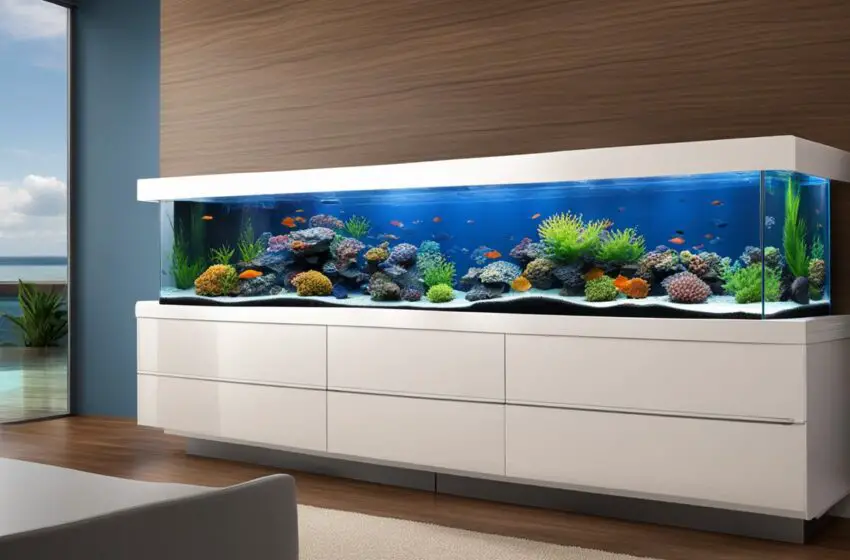Regenerative Filters: A Sustainable Approach

Energy-efficient marine aquarium filtration systems offer a sustainable approach to maintaining the health and well-being of marine life in tanks. With approximately 90% of our time spent indoors, there is a growing focus on the quality of the indoor environment and its impact on our health. The concept of sustainable architecture has evolved to prioritize not only energy efficiency but also the health and well-being of occupants.
Regenerative design is a recent sustainability paradigm that aims to go beyond minimizing negative environmental impacts to actively contribute to the regeneration of natural systems. Within the field of regenerative design, regenerative filters play a crucial role in creating a sustainable and thriving marine environment in aquariums. By adopting regenerative filtration systems, aquarium owners can enhance the comfort and health of marine life while minimizing energy consumption and environmental impact.
The integration of regenerative principles in marine aquarium filtration systems aligns with the global goal of achieving good health and well-being for all by 2030.
Key Takeaways:
- Energy-efficient marine aquarium filtration systems prioritize the health and well-being of marine life.
- Regenerative filters contribute to the regeneration of natural systems in marine aquariums.
- By adopting regenerative filtration systems, aquarium owners can minimize energy consumption and environmental impact.
- The integration of regenerative principles aligns with global sustainability goals.
- Aquarium owners play a crucial role in creating a sustainable and thriving marine ecosystem.
The Principles of Regenerative Filtration Systems
Regenerative filtration systems in marine aquariums are guided by a set of principles that prioritize the regeneration of natural systems and the well-being of marine life. These principles include a holistic approach to filtration, recognizing the interconnectedness of various components in maintaining a healthy marine environment. The focus is on improving soil health, promoting biodiversity, conserving water, and sequestering carbon.
Just as regenerative agriculture aims to improve soil health and promote biodiversity, regenerative filtration systems in marine aquariums enhance water quality, promote the growth of beneficial microorganisms, and foster the overall well-being of marine life. By adopting regenerative filtration principles, aquarium owners can create a sustainable and thriving marine ecosystem within their tanks.
Here are the key principles of regenerative filtration systems:
- Holistic approach: Regenerative filtration systems consider the interconnectedness of filtration components and their impact on the overall health of the marine ecosystem.
- Soil health: By enhancing soil health within the filtration system, aquariums can support the growth of beneficial microorganisms and ensure the availability of essential nutrients for marine life.
- Biodiversity promotion: Regenerative filtration systems create habitats for diverse marine organisms, promoting biodiversity and ecosystem resilience.
- Water conservation: These systems focus on minimizing water waste and reducing reliance on freshwater sources, contributing to water conservation efforts.
- Carbon sequestration: By sequestering carbon within the filtration system, regenerative filters contribute to mitigating climate change impacts and enhancing the resilience of marine ecosystems.
By adhering to these principles, aquarium owners can contribute to the well-being of marine life, promote sustainable nutrition, and create a more environmentally friendly approach to aquarium filtration.
Practices and Techniques of Energy-Efficient Filtration Systems
Energy-efficient marine aquarium filtration systems incorporate various practices and techniques to achieve the principles of regenerative filtration. These practices include:
- Cover cropping: Introducing beneficial microorganisms to enhance water quality and nutrient cycling.
- Minimal tillage: Employing techniques to preserve soil structure and minimize disturbance to the marine environment.
- Agroforestry: Creating a mutually beneficial relationship between plants and animals to promote biodiversity, nutrient cycling, and carbon sequestration.
- Livestock integration: Integrating animals into the system to further enhance biodiversity, nutrient cycling, and carbon sequestration.
- Composting: Implementing composting practices to reduce the need for synthetic fertilizers and improve soil fertility.
- Nutrient cycling: Implementing techniques to enhance the natural cycling of nutrients within the marine ecosystem.
By incorporating these practices and techniques, aquarium owners can create a sustainable and balanced marine ecosystem within their tanks, promoting the health and well-being of marine life while minimizing environmental impact.
Benefits of Cover Cropping in Energy-Efficient Filtration Systems
Cover cropping is a fundamental practice in energy-efficient filtration systems that offers multiple benefits. By introducing beneficial microorganisms, cover cropping enhances water quality and promotes efficient nutrient cycling. These microorganisms break down organic matter, converting it into forms that can be readily absorbed by aquatic plants and marine life. Additionally, cover cropping helps control the growth of undesirable algae species by outcompeting them for nutrients and creating a more balanced ecosystem within the tank.
The Role of Agroforestry in Energy-Efficient Filtration Systems
Agroforestry plays a vital role in energy-efficient filtration systems by promoting biodiversity, nutrient cycling, and carbon sequestration. By incorporating trees and shrubs into the aquarium setup, aquarium owners can create a diverse habitat that supports a wide range of marine organisms. The roots of these plants help stabilize the soil, prevent erosion, and provide additional filtration capacity. The interaction between the plants and marine life within the agroforestry system promotes nutrient cycling and contributes to the overall health and resilience of the marine ecosystem.
Benefits of Composting and Nutrient Cycling in Energy-Efficient Filtration Systems
Composting and nutrient cycling are key practices in energy-efficient filtration systems that reduce reliance on synthetic fertilizers and improve soil fertility. By composting organic waste from the tank, aquarium owners can produce nutrient-rich compost that can be used to nourish the plants and enhance soil health. The natural breakdown of organic matter in the composting process releases nutrients that can be absorbed by the aquatic plants, promoting their growth and contributing to the overall balance of the ecosystem.
Environmental and Social Benefits of Energy-Efficient Filtration Systems
Energy-efficient marine aquarium filtration systems offer a range of environmental and social benefits. These systems contribute to the regeneration of soil, enhancing soil fertility and nutrient cycling. By promoting enhanced biodiversity, energy-efficient filtration systems create habitats for a wide range of marine organisms, improving ecosystem resilience.
These systems also help improve water quality by reducing runoff and pollution. Energy-efficient filtration systems actively sequester carbon, mitigating climate change impacts and enhancing the resilience of marine ecosystems.
In addition to the environmental benefits, energy-efficient filtration systems offer economic viability for aquarium owners, reducing input costs and diversifying income streams. These systems also foster community resilience by promoting local food systems and strengthening rural economies.

| Environmental Benefits | Social Benefits |
|---|---|
| Regeneration of soil | Economic viability for aquarium owners |
| Enhanced biodiversity | Community resilience |
| Improved water quality | |
| Carbon sequestration |
Overcoming Challenges and Scaling Up Energy-Efficient Filtration Systems
While energy-efficient marine aquarium filtration systems offer significant benefits, they also face challenges that need to be addressed for widespread adoption and scalability.
Firstly, financial and technical barriers present obstacles to transitioning from conventional filtration systems to energy-efficient options. The initial investment and maintenance costs associated with energy-efficient systems can be a deterrent for aquarium owners. Additionally, the technical knowledge and expertise required to operate and maintain these advanced filtration systems may pose challenges for some owners.
Secondly, supportive policies and market mechanisms are crucial in incentivizing the adoption of energy-efficient filtration systems. Governments and industry regulators can play a vital role in providing financial incentives, tax credits, and subsidies to encourage aquarium owners to invest in sustainable filtration technologies. Market support, such as the availability of energy-efficient filtration products and technologies, also needs to be enhanced to facilitate widespread adoption.
“The transition to energy-efficient filtration systems requires overcoming financial and technical barriers and establishing supportive policies and market mechanisms.”
Thirdly, scaling up energy-efficient filtration systems is essential for effective climate change mitigation. These systems contribute to the reduction of greenhouse gas emissions through energy conservation and have the potential to actively sequester carbon. However, broader adoption and implementation are necessary to achieve significant environmental impact.
Fourthly, land-use efficiency is a challenge that needs to be addressed to ensure sustainable food production without further expansion of agricultural land. Energy-efficient filtration systems can contribute to land-use efficiency by optimizing the use of available space and resources.
Finally, improving soil health through regenerative filtration systems is crucial for achieving long-term food security and environmental sustainability. These systems promote nutrient cycling and the regeneration of degraded land, leading to enhanced agricultural productivity and resilience.
“By addressing financial and technical barriers, establishing supportive policies, and promoting land-use efficiency, we can overcome challenges and scale up energy-efficient filtration systems, contributing to climate change mitigation and long-term food security.”
To summarize, overcoming the challenges faced by energy-efficient filtration systems requires addressing financial and technical barriers, establishing supportive policies and market mechanisms, promoting climate change mitigation, optimizing land-use efficiency, improving soil health, and ensuring long-term food security. By addressing these challenges, we can unlock the full potential of energy-efficient filtration systems and create a sustainable future for marine aquariums.
Conclusion
Energy-efficient marine aquarium filtration systems, powered by regenerative filters, are a sustainable solution for maintaining the health and well-being of marine life in tanks. By embracing regenerative principles and practices, aquarium owners can create a thriving marine ecosystem while minimizing energy consumption and environmental impact. This integration not only aligns with the global goal of achieving good health and well-being for all, but also paves the way for a sustainable and prosperous future for marine life in our tanks.
As we look ahead, energy-efficient filtration systems will play a crucial role in revolutionizing the sustainability and performance of marine aquariums. By adopting regenerative filters, we can enhance the efficiency and effectiveness of marine aquarium filtration, ensuring the optimal conditions for marine life to thrive. These systems not only improve water quality and biodiversity but also contribute to carbon sequestration, mitigating the impacts of climate change on our oceans.
Embracing regenerative filters is a step towards creating a sustainable and thriving future for marine life in our tanks. By prioritizing sustainability, we can reduce our ecological footprint and create a healthier environment for marine organisms. Let us embrace the power of regenerative filters to build a future where marine aquariums serve as models of sustainability, showcasing the beauty and resilience of our oceans.
FAQ
What are energy-efficient marine aquarium filtration systems?
Energy-efficient marine aquarium filtration systems are filtration systems designed to minimize energy consumption while maintaining the health and well-being of marine life in tanks.
Why should I consider using energy-efficient filtration systems in my marine aquarium?
Energy-efficient filtration systems offer a sustainable approach to maintaining a thriving marine ecosystem while minimizing energy consumption and environmental impact.
How do regenerative filtration systems promote the regeneration of natural systems?
Regenerative filtration systems prioritize the health and well-being of marine life by promoting soil health, biodiversity, water conservation, and carbon sequestration.
What practices and techniques are used in energy-efficient filtration systems?
Energy-efficient filtration systems incorporate practices such as cover cropping, minimal tillage, agroforestry, livestock integration, composting, and nutrient cycling.
What are the environmental and social benefits of energy-efficient filtration systems?
Energy-efficient filtration systems contribute to soil regeneration, enhanced biodiversity, improved water quality, carbon sequestration, economic viability, and community resilience.
What challenges need to be addressed for widespread adoption of energy-efficient filtration systems?
Financial and technical barriers, policy and market support, climate change mitigation, land-use efficiency, and soil health are challenges that need to be overcome for scaling up energy-efficient filtration systems.
How do energy-efficient filtration systems contribute to the sustainability and performance of marine aquariums?
Energy-efficient filtration systems offer a sustainable approach to maintaining the health and well-being of marine life in tanks, and they play a crucial role in revolutionizing the sustainability and performance of marine aquariums.



